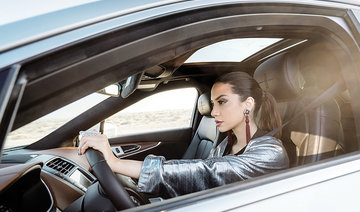DUBAI: Surviving as an independent musician in the Middle East takes a level of determination and, occasionally, stubbornness that many would reasonably feel was just too demanding. Tania Saleh has survived for more than two decades. Not just survived, but thrived.
Saleh, who first gained recognition in Lebanon in the late Nineties, when support of any kind for non-mainstream art was practically non-existent, is now hailed as a pioneer of the alternative Arabic music scene. She’s lauded for her singular, emotive vocal style and her heartfelt, unflinchingly honest lyrics that have tackled both the personal and the political. And she has made her name without the backing of a label, or even a manager.
You might expect Saleh’s struggle to have been all the greater because she’s a woman. But, as she tells it, that’s not the case. If anything, as an artist, she feels it’s been a blessing.
When she spoke to Arab News on the eve of her appearance at Wasla music festival in Dubai in early February, Saleh had recently attended a workshop in Sweden about how women in the MENA region are making themselves heard in the music industry.
“Sometimes (at these events), the conversation veers into ‘Oh, poor woman. It’s so tough …’ But, in my case, I never felt like I was mistreated because I was a woman or I didn’t get certain offers because I was a woman,” she said. “I always felt that I wanted to be a good musician before my gender even came into it.
“So, I never felt like being a woman was my problem,” she continued. “I felt that the market was the problem. The people were the problem. People were used to listening to a certain kind of music; either the traditional, like Fayrouz or Umm Kulthoum — old but good material — or the mainstream on TV or the radio. The majority of people didn’t want to look for something new, but those who did found us. And they realized there was something there.”
The real struggle for independent artists in the region, Saleh feels, is unrelated to gender. It’s simply the restrictions on self-expression.
“In general, in this region, it’s not as easy to express yourself, because of religion, because of society, because of how people view you as an independent person,” she explained. “When you can’t express yourself, whether you’re a woman or a man, it’s a problem. And it’s not because you don’t have enough guts, it’s because whatever you say isn’t going to be accepted.”
In her latest project, the album “Intersection,” released in October last year, Saleh uses classical Arab poetry, and also produced a number of street-art pieces around the region, to examine some of these themes. It is, she said, “an ode to the Arab streets.”
It started with one of the two tracks from the LP for which she wrote the lyrics herself, “Show Me The Way.”
“The song is a question about the Arab world. Like, ‘Is this really the Arab world? Are you still brothers? Or are you killing each other?’ That’s the main question,” she said. “So I chose poems and poets related to this topic. Poets who talked about their societies and their streets. And nothing has really changed. If you hear these poems today, you’d think they were written today.”
Setting the words of legendary poets including Khalil Gibran, Mahmoud Darwish and Nizar Kabbani, among others, to song was, Saleh said, “a big responsibility.” It was also a chance to bring a feminine perspective to traditionally male-dominated Arabic poetry (although, she pointed out, most of the poets she selected were “very open to their feminine sides,” and two of the poets featured — Nazik Al-Malaika and Joumana Haddad — are women).
For Saleh, the importance of a female perspective in art cannot be overstated.
“Man is a hunter. In every way. Hunting food, war, women … The woman is not a hunter, and that shows in her way of expression,” she said. “Women can bring something to poetry — to art of all kinds. The ways women express their emotions are different from men. That’s why it’s so important to have more songwriters who are women. It’s not because of feminism, or equality, it’s because the feelings we bring in are different. The way we see things is different. Particularly when we become mothers. And it’s important to see that perspective on things.”
The guiding principle behind Saleh’s long music career has been integrity. The emotional honesty of her vocals and lyrics is mirrored in her actions. And sometimes in her lack of action. Like turning down big-money offers to perform for, say, “a TV show that supports stupid stuff.”
“It can be a statement to say no,” she said. “When you see how your image has remained intact because of all those decisions you’ve taken, you’re fine. And you know people will remember you how you want to be remembered.”
It’s the reason she still fights to control every aspect of her career. “I’m not making a lot of money, but I’m fine,” she said, while admitting she’d “maybe” like to own a small boat one day.
“I don’t dream of having a lot of money. I don’t like expensive stuff. To me, it doesn’t matter,” she explained. “What matters is how I feel and the integrity of my work, and having honest relationships with people.
“After all, you write your own story,” she continued. “You don’t want someone else to write it for you.”


























